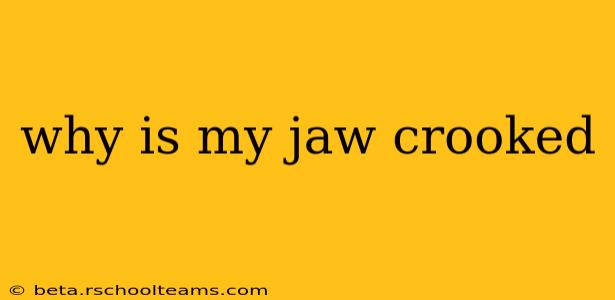A crooked jaw, or more accurately, mandibular asymmetry, is a surprisingly common concern. While it might seem alarming, it's often harmless and simply a variation in facial structure. However, understanding the potential causes is crucial for addressing any underlying issues. This comprehensive guide explores the reasons behind a crooked jaw, from genetics to more serious conditions.
What Causes a Crooked Jaw?
Several factors contribute to a crooked jaw. Let's delve into the most common ones:
1. Genetics: The Blueprint of Your Face
Often, a crooked jaw is simply inherited. Just like your eye color or height, the shape and structure of your jawbone are influenced by your genes. If family members have noticeable jaw asymmetry, it's more likely you will too. This is frequently a benign variation and requires no treatment.
2. Trauma: Injuries and Accidents
A significant blow to the jaw, perhaps from a sporting accident or a fall, can cause misalignment. This type of injury can lead to a fracture, displacement of the jawbone, or damage to the temporomandibular joint (TMJ), the hinge connecting your jaw to your skull. Such injuries necessitate professional medical attention.
3. TMJ Disorders: Affecting the Jaw Joint
Temporomandibular joint (TMJ) disorders can impact jaw alignment. These disorders, often stemming from inflammation or injury, can cause pain, clicking sounds, and limited jaw movement. Over time, the uneven stress on the joint might lead to a perceived crookedness.
4. Growth Patterns: Uneven Development
During childhood and adolescence, the jawbone develops and grows. Uneven growth can result in a crooked jaw. This is often more noticeable during puberty's rapid growth spurts. In some cases, this uneven growth can be addressed with orthodontic intervention during these formative years.
5. Dental Issues: Misaligned Teeth and Jaw
Misaligned teeth can influence the appearance of a crooked jaw. Crowding, overbites, underbites, and other dental malocclusions can subtly shift the jaw's position, creating the illusion of asymmetry. Orthodontic treatment may help correct the misalignment and improve the jaw's appearance.
6. Rare Medical Conditions: Underlying Health Factors
In rare cases, a crooked jaw might be a symptom of a more serious underlying medical condition such as:
- Hemifacial Microsomia: A rare birth defect affecting the development of one side of the face.
- Osteomyelitis: A bone infection that can damage the jawbone.
- Tumors: Jawbone tumors, though rare, can lead to asymmetry and require specialist attention.
Is a Crooked Jaw Always a Problem?
Many instances of jaw asymmetry are purely cosmetic and pose no health risks. However, if the crookedness is accompanied by pain, clicking in the jaw, difficulty opening your mouth, or other symptoms, it's vital to seek professional medical advice. Your doctor or dentist can perform a thorough examination to determine the underlying cause and recommend appropriate treatment.
How Is a Crooked Jaw Diagnosed?
Diagnosing the cause of a crooked jaw usually involves a combination of:
- Physical examination: Your doctor or dentist will examine your jaw and face to assess the asymmetry.
- Medical history: Discussing your medical history, family history, and any recent trauma is crucial.
- Imaging tests: X-rays, CT scans, or MRI scans can provide detailed images of your jawbone and surrounding structures to identify fractures, tumors, or other abnormalities.
Treatment Options for a Crooked Jaw
Treatment options vary greatly depending on the cause of the asymmetry. They might include:
- Orthodontics (braces or clear aligners): To correct dental misalignment.
- Surgery: For more severe cases of asymmetry, jaw surgery (orthognathic surgery) might be considered.
- Physical therapy: To treat TMJ disorders and improve jaw mobility.
- Medications: Pain relievers or anti-inflammatory medications to manage pain and inflammation associated with TMJ disorders.
When Should I See a Doctor?
Consult a doctor or dentist if you experience:
- Significant jaw pain: Especially persistent or severe pain.
- Jaw clicking or popping: Accompanied by pain or restricted movement.
- Difficulty opening or closing your mouth: A clear indication of a potential problem.
- Facial asymmetry that worsens over time: Suggests an underlying condition needs attention.
Remember, a crooked jaw isn't always cause for alarm. However, understanding potential causes and seeking professional medical advice when necessary is crucial for ensuring your oral health and overall well-being.
